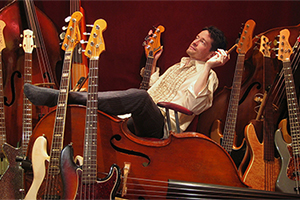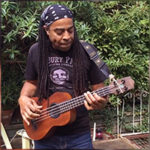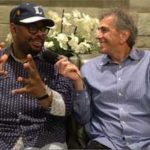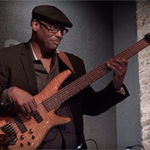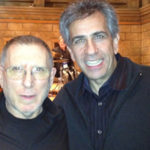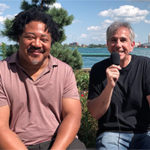In-demand doubler recounts the unlikely events that landed him biggest rock gig of his life
Exclusive interview with FBPO’s Jon Liebman
Nov. 15, 2021
Conrad Korsch seems to have a touch of the whirlwind to him. Though he focuses much of his energy on playing electric and acoustic bass, the multi-instrumentalist also wears the hats of singer, musical director, bandleader, composer, producer, and instructor. An alumnus of Settlement Music School and Temple University, the Philly native may be best known for his time as Rod Stewart’s former bassist and musical director. But he’s also worked over the years with an eclectic group of artists that include Debbie Gibson, Cyndi Lauper, Elvis Costello, Bette Midler, Nelly Furtado, Macy Grey, Jackson Browne, Rosanne Cash, Carole King, Ani DiFranco, Adam Levine, Liza Minelli, Neko Case, Gloria Gaynor, and Martha Reeves. Beyond that, Korsch has had extensive experience on Broadway, even starring as an original cast member of Swing! He also has numerous television and film credits to his name, among which can be counted live appearances on shows like Saturday Night Live and the Tony Awards. As an instructor, the bassist has taught at Hunter College, the University of the Arts, Swarthmore College, Sam Ash Music Institute (Manhattan), and the NARAS “Grammy in the Schools” program. He also runs his own production company, Scrumptious Music, through which he released his 2016 solo album, On The Threshold.
FBPO: You’ve done so much stuff in the music world. How did it all start?
CK: Oh, I started the same way most people do, just taking piano lessons as a kid from the old lady down the street. We had a banged up piano in my basement. I was about 6 years old, started taking lessons from her and stuck with it. And then that teacher passed away after about five years, and I moved on to Settlement Music School. Christian McBride went there, Joey DeFrancesco. I believe I read that Albert Einstein went there. So it was a really cool school. They had a jazz ensemble, chamber music ensembles and stuff. I studied piano there for another five or so years.
FBPO: How old were you when you started attending that school?
CK: I was like in fifth or sixth grade, probably sixth. But that school, it’s only a music school, so it’s a place that you go after your regular school. It wasn’t like a boarding school for music. I would do my regular school classes at my neighborhood school, and then once a week I would have lessons at Settlement Music School.
FBPO: How did you become a bass player?
CK: I wanted to join the jazz ensemble and I asked if they needed a piano player, but they already had a piano player. They said, “We need a bass player.” At this point, I was probably a junior in high school. In my first semester of high school, the band director said, “You can have free music lessons here.” And I said, “Okay, I’ll study piano here then, so my parents can save the money.” And they said, “Well, we don’t teach piano, we only teach orchestral instruments.” I said, “Okay, how about guitar?” “Well, guitar is not an orchestra instrument, but you could study bass.” And I’m like, “What’s bass?” This is when I was like 14 years old. I was just starting. And they explained the bass to me. And I was like, “Okay, that sounds cool.”
FBPO: How did you take to the bass, initially?
CK: I got to my first lesson, and it was upright bass! They handed me the bow and I was like, “What is this?” I was thinking it was going to be bass guitar. I mean, I weighed about 100 pounds and I was like, whatever, five-foot something, so it was towering over me. I did the minimum requirement one semester and then I quit. But in the meantime, had gotten a Yamaha electric bass for $300. And after playing piano for 10 years and being in two bands in my entire life, it’s the typical story. I pick up the bass and a month later I’m in three or four bands!
FBPO: At the time, did you have a Rod Stewart-type of gig in mind, or were you expecting to do something else with your musical training?
CK: It was like I knew I was going to go to school for music. That’s all I’d ever done in my life and all I cared about. At the time that I started school, I envisioned myself more as a rock player. They only offered a classical program and a jazz/commercial program, and that fit more into my wheelhouse. I was into like Living Colour. Remember that group?
FBPO: Yes. Muzz Skillings, and then Doug Wimbish.
CK: Yeah! And Rush and things like that. Some of those guys had gone to Berklee. It was just sort of, you read the magazines and it’s like, “Oh, these guys had a jazz degree.” It seemed like anybody who had studied jazz had all kinds of chops and could improvise and all that. That appealed to me very much more so than going through the regimented classical program as a pianist.
FBPO: How did your career get rolling? What kind of stuff were you doing initially when you started playing bass professionally?
CK: Well, besides teaching some lessons, I always kept some rock bands going on the side. I had a local band in Philly. We would do a lot of Chili Peppers type stuff, Primus type stuff, covers and a lot of originals. We were able to write challenging, kind of progressive stuff, so that kept me creative. But I don’t know, I just started picking up gigs. Some of my teachers started hiring me, which is like shocking. I picked up a steady Saturday night with an amazing bebop guitar player named Jimmy Bruno. Have you heard of him?
FBPO: Yes, I have.
CK: That guy plays like a million miles an hour! His command of the guitar is insane. And of course, he’s an encyclopedia of tunes. He would call some obscure tune and then I would go into my backpack, looking through four or five different Real Books trying to find the title while the audience was waiting. And he’d go, “Ah, kid! It’s in A-flat. Bridge goes to the four. You’ll hear it.” And then he would start playing an intro. I would just hang on for dear life, man, but it got my ears together. And it taught me how to hear my way through tunes and predict things. All the standards, there’s formulas that they tend to move in. And we would play trio, it was upright bass, guitar, and drums, so I had to solo on every song. It was an amazing, super scary experience. But over the next couple years, that kicked my ass into shape, big time.
FBPO: Philly’s got such a rich musical heritage.
CK: I actually took a lesson with Gerald Veasley, who was in the hood. And then he had previously played in this Brazilian band called Minas, a local band. And they reached out to him because they were looking for a new full-time bass player and he recommended me for that. I ended up playing with them for a couple years, so I learned all this Brazilian repertoire. I was playing with all these other guys too. The odd theater gig would come up, so I would have to be sightreading.
FBPO: Were you playing much upright?
CK: I was playing in the big band at school. The second year that I was there, Chuck Israels, the bass player who had worked with Bill Evans, was the director of the program. I had just started playing upright. At one point there were only a few bass players in the program, which actually was great for me because if there were a dozen ensembles and (only) three bass players, I ended up playing in a lot of them, with people that were way better than me, in higher grades. I shouldn’t have been playing with them, except the senior bassist had just graduated, so I was the next in line, that kind of thing. There were a lot of opportunities to get my butt kicked.
FBPO: How did you get the gig with Rod Stewart?
CK: I was playing in a band in New York City called Mojo Mancini. John Leventhal, producer, guitar player, songwriter, he was one of the members. And Shawn Pelton, the drummer, who plays in the Saturday Night Live band. I was subbing in the Saturday Night Live band for those couple seasons before James Genus took over. And when the label, Sony, with Clive Davis was putting a band together to do a TV promo (of jazz standards), they wanted jazz guys who could also look and play rock and roll if they needed to because they weren’t really quite sure what the promo was going to be all about. Shawn and John both recommended me to Jill Dell’Abate, the contractor. That was enough for her to trust and she hired me.
FBPO: So you were playing upright?
CK: For the first year, I only played upright bass with Rod. We did the TV promo, a DVD and some other things. And then he did another one of those records and, as you know, they were huge successes, and it became sort of undeniable that he would have to include those in his concerts going forward. So they auditioned me for the rock band on electric bass to make sure that I could cover both things. It is ironic if you trace this conversation back, though, starting out as a rock player and then being strong-armed into playing the upright bass, and quitting it and then revisiting it. It’s the upright bass that actually got me like the biggest rock and roll gig of my life!
FBPO: What’s keeping you busy these days?
CK: Well, I played in the House Orchestra for the Tony Awards. They’ve been calling me since 2015. I’ve only been available to do it three times, but I love that gig because it’s so challenging, sight-reading all that crazy stuff, all the different shows. One minute you’re like sawing away at the bass with the bow with a classical-type conductor, and an hour later, you’re playing with a pick, playing Alanis Morissette songs. It’s madness. And then you have to do it on live TV. You never know who’s going to win and you’ve got five different pieces of music on your stand, you’re scrambling to get it up in time.
FBPO: I always wondered about that. How much notice does the band get? Do they find out the same time the rest of the world finds out?
CK: Yeah, we’re listening. Yeah, yeah. We’re listening and we basically have excerpts from like five different shows on our music stand at one time. And you listen and the conductor has a talkback mic and he’ll … even though we all hear it, he’ll also say, “Get up…” and we scramble and then we go. Sometimes you miss a down beat. It’s commando all the way.
FBPO: Wow.
CK: I love it. I love that high pressure thing. Actually, this month, I was the COVID sub for Saturday Night Live, once again. Basically, they just have guys on hold because everybody has to get tested a couple days before the show. Then they get a rapid test again the day of the show. So each player has to have a sub lined up, and that sub gets sent all the music for the week to learn. (SNL bandleader) Lenny Pickett picks the songs in advance. It’s just nice to be on that list. What a legendary band. And even preparing the music, it’s all that Tower of Power kind of stuff. You know the sound, there’s 16th-note funk bass lines.
FBPO: Tell me about Scrumptious Music.
CK: Scrumptious is the name of my publishing company and also just an umbrella for any of my production, composition type work. At the end of the day, it’s me. I don’t have a staff of people running around, but I have thousands of contacts in my phone and if I ever anything done, I can call on Shawn Pelton to do a drum track from his home and have it to me a couple hours later, uploaded by the internet. I mix here. I have a studio set up here in my Manhattan place, with isolation and all the lines running and all that kind of stuff. The fact that I call it Scrumptious Music was just because I had to have a name for the publishing company.
FBPO: What kind of basses are you playing primarily?
CK: My go-to would be either my ‘66 P bass or my ‘72 Jazz bass. But these days you got to ask, “Is there a 5-string?” I have several now. Moollon sent me a few things that are really nice. And then I have a couple of Alleva Coppolos, Jimmy Coppolo. a 5 and a 4, and I have several Laklands, the passive Joe Osborn ones, Jazz-bass style. And I have a couple fun things with flatwounds on them. I have a Danelectro reissue, and then I have this thing that’s really cool. It’s called a Conrad bass. It’s from the sixties, I believe it was made by Aria. Remember Aria?
FBPO: Yes.
CK: It’s Japanese thing from the sixties and I literally saw it on eBay for like $150, and I just thought, “It’s got my name on it. I’m just going to get it and hang it on the wall, like as a joke.” And I plugged the thing in and it has the coolest, thumpiest sound. And it’s like a short-scale, and I put some flats on that, and man, I’ve used that on a lot of recordings. That thing gets a lot of mileage. And what else? I got a fretless, Rob Allen, 5-string, which is a gorgeous, semi-hollow body. It just sustains for eons. And I have three upright basses right now, two Kays, of course, and my main recording studio bass is … or if I’m doing a lot of bowing, is a Juzek.
FBPO: What advice do you have for someone who wants to learn bass?
CK: I always feel like if you learn your music theory and you learn to read music, then the possibilities are endless because there’s so much repertoire out there that you can sort of continue your studies on your own. I really do try to emphasize how important music theory is and the ability to read somewhat. Even if you can’t sightread but if you could sort of figure out reading, then you can play the Bach cello suites, you can go through the Charlie Parker Omnibook, you get all this kind of stuff that’s going to challenge you in other ways. But that’s just me. I mean, if they were really pushing back and they didn’t want to do it, then I would probably have them learn bass lines off of records if they want to play the blues, they want to jam with their friends. You’re like, “Okay, learn the bass line to “Good Times, Bad Times,” John Paul Jones, or the first however many bars of it. They might run into issues anyway, with getting it under their fingers, or they might have picked out some of the wrong notes. Then we could work on it together and go through the process of picking out stuff.
FBPO Makes sense.
CK: People are looking for shortcuts all the time. Not so much a 70-year-old, but you know what this generation is like. And with the attention spans and everything’s on YouTube and all that kind of stuff. Everybody wants to just jump the gun, but there’s no replacement for actual studying. Music theory is undeniable and it applies to every instrument. It’s not just a bass thing. Becoming a better musician, in general, is never a bad thing. And it’s only going to inform your bass playing and your overall musicianship and open up all kinds of opportunities for you. Even if all you want to do is play the blues in the basement and drink six packs with your army buddies, that’s cool too. But you’re going to do that even better if you’ve actually learned something about music.
FBPO: What would you be if you were not a bass player?
CK: I think doctors are pretty amazing. I don’t know if I’d have the patience to do all that schooling, but the idea of being able to fix a human body, or diagnose your own stuff when you wake up and you’re like, “Oh man, I feel like crap, and I have this symptom, I have that symptom.” Instead of having to make an appointment and go sit in a waiting room for three hours and then pay a bunch of money to just go, “Oh,” stick my tongue out, “It’s that. Now let go take a pill.”
See Jon’s blog, with key takeaways from this interview here.
